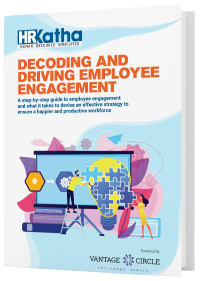Employee Engagement in HR: What It Involves?

From the day an employee joins the company to the day they leave, the human resources department has the job of making impactful decisions that directly affect an employee’s life. Thus, in this article on employee engagement in HR, we will be looking at the various ways in which HRs can promote the level of engagement in an organization.
First of all, what is employee engagement? Employee engagement is defined as when employees feel commitment and passion for the job because they feel like they belong.
A highly engaged workforce will be happier, more productive, and truly go above and beyond. It is an ultimate recipe for business success.
It goes without saying that when we talk about a company's employee experience, the role of HR professionals gets automatically tied to it.
Human resources are the only department that is invariably connected to every employee of the organization.
Not only are HR professionals more attuned to overall employees’ needs but they also have a much broader view of the company’s strengths and weaknesses.
Thus, in the quest of engaging employees, HR professionals have the most crucial role in the successful implementation. Let’s take a look at how:
Employee Engagement In HR: 5 HR Roles For Increased Employee Engagement
1. Identify Problem Areas Within The Company Culture
As stated earlier, HR professionals are deeply attuned to the changing needs of the workforce. With the responsibility of dealing with every job role and department in the company, they can distinguish when something feels off.
Similarly, the road to establishing employee commitment starts with identifying the company culture's major problem areas.
Leaders might see a problem such as high employee turnover and immediately think of increasing pay or bonuses. However, HR professionals go beyond the usual employee motivators and look at the seemingly small but drastic problems.
For example, an employee leaving an organization might have to do less about the pay and more about not getting due credit and appreciation.
The human resources department can genuinely aid in the engagement efforts by taking a much more people specific approach.
2. Building Awareness About Enhancing Employee Experience
Another primary HR role is to ensure that the company higher up’s gets bought up-to-speed about the need for a highly engaged workforce. Thus, to promote a better employee experience, HR professionals need to inspire proactivity among other leaders and managers.
Firstly, look to highlight how employees being engaged in their work will influence positive business outcomes. An example of this could be an employee being well appreciated and recognized. Such an employee would be most likely to display higher effort in their jobs than their peers.
All in all, make a case for employee engagement driving the ultimate business profits.
Secondly, HR professionals should keep themselves updated with the latest trends and tactics involving engaging employees. It is their job to educate others about the importance of engagement initiatives and continuously look for new ways to do so.
89% of HR leaders agree that ongoing peer feedback and check-ins are key for successful outcomes.
Finally, it’s not only company leaders who need to be involved in the engagement initiatives. It is also the employees themselves. Unless the people show any interest in such measures, employee commitment is just a said benefit on paper.
To make peer recognition more frequent and a cultural norm, look for some peer recognition platforms such as Vantage Rewards. With a social media imitated feed, appreciating peers is fun, interactive, and timely.
3. Providing Training And Development Opportunities
There is a famous saying that, “Employees don’t quit jobs, they quit managers.” While not wholly accurate, it does strike a cord.
Managers are the people who get to lead and evaluate the work that employees do daily. Thus, to see increased employee engagement levels, managers should be on-board about any new engagement initiatives.
The best way is to familiarize managers with examples of what “engaging employees.” Demonstration and training go a long way in bringing forth the desired behaviors. Here are a few pointers for HR professionals to train managers:
- Emphasize the value of showing appreciation for a job well done.
- On how to develop team dynamics and encourage better peer relationships.
- Practicing empathy-based leadership.
- The importance of being open to ideas and suggestions from employees.
- On how to deal with poor employee performance.
4. Increased Employee Engagement Initiatives
Many HR leaders consider that their employee recognition program helps with employee experience (89 percent), employee relationships (86 percent), company culture (85 percent), employee engagement (84 percent), and organizational values (83 percent).
The central part of any employee engagement efforts lies in the actions. The feeling of belonging drives employee commitment. And to make people feel respected and appreciated, there are quite a few ways to do so. As an HR professional, a huge chunk of this task falls upon you.
Recognition
Even a simple “thank you” goes a long way to make people feel appreciated. With frequent and timely recognition, employees are more likely to exhibit higher morale and eventually, engagement.
Rewards
Rewards have proven to be fantastic motivators. Getting rewarded for a job well done will encourage employees to give continued good performance while making them happy. A good employee engagement initiative is to pair rewards with recognition to make employees feel happy truly.
Some good reward options are reward points, gift cards, paid vacations, etc.
Rewards and Recognition Platform
The cost of running an in-house reward and recognition program is massive. The hidden costs of arranging, implementing, and measuring the outcomes are simply not feasible in the long run. Thus, HR professionals should look for a suitable reward and recognition platform that’ll suit their company’s needs the best.
Recommended Article: The Ultimate Guide To Employee Rewards And Recognition
Employee Engagement Activities
Employee engagement activities are measures or events hosted to make employees feel lucky to be a part of the company culture. We have got a list of these employee engagement activities that you can check out.
Icebreakers/Team-Building
Team-building or icebreakers are often designed to foster team bonding and collaboration. These activities are great for new employees who feel left out or even a newly formed team.
5. Measuring Employee Engagement Regularly
HR professionals should always estimate the ROI of any employee engagement initiatives in a work environment. Because without knowing the changes, it will be difficult to gauge the improvements in the level of engagement.
The most recommended way to measure the engagement level is through employee engagement surveys. The reason for the popularity of such employee engagement surveys is that they assess engagement by highlighting the strengths and weaknesses.
Thus, HR professionals and leaders get a clearer picture of what to improve upon. Additionally, the positive influences can be noted and further honed.
The data and insights gathered forms such surveys can be hugely beneficial in identifying patterns that positively increased employee engagement levels in the company.
However, the key is to hold these engagement surveys regularly, frequent, and timely.
To conduct easier and faster surveys that employees can finish in minutes, look for some Pulse survey tools such as Vantage Pulse.
Recommended Article: A Brief Guide On Employee Pulse Surveys
Finally
How else do you think employee engagement in HR roles can be improved upon? Do let us know in the comments section below.

Vantage Circle is a simple AI-powered Rewards & Recognition Platform for upgrading your employee experience and engagement for better productivity.






